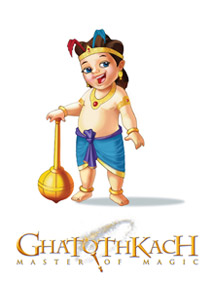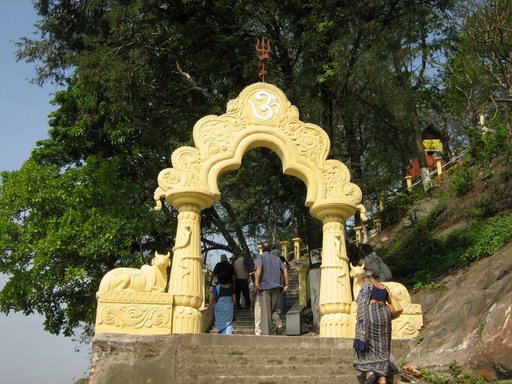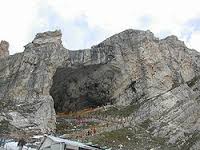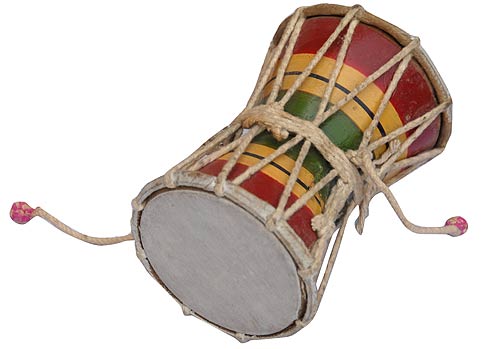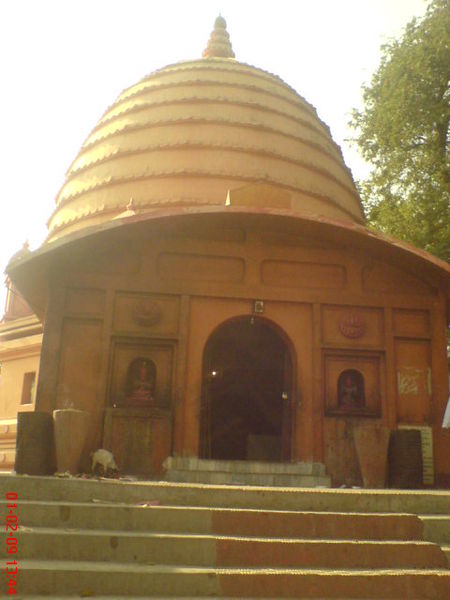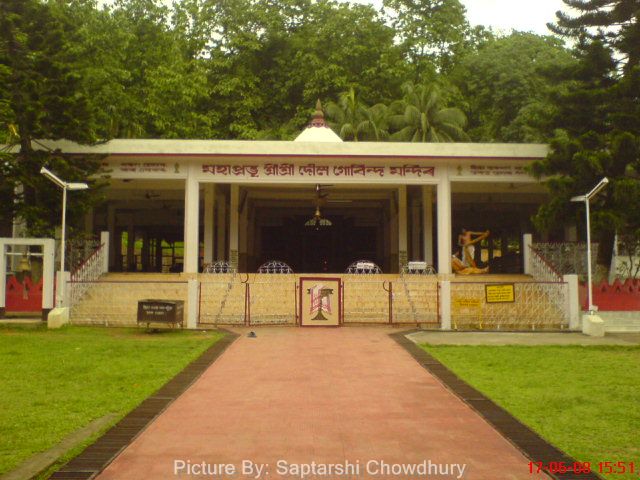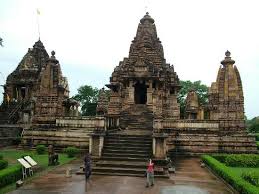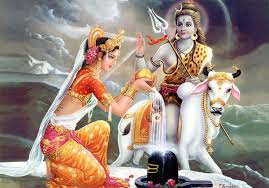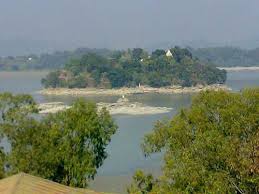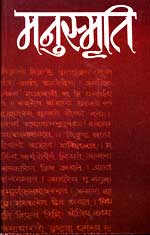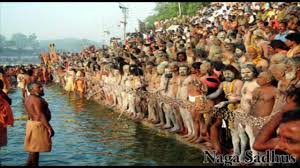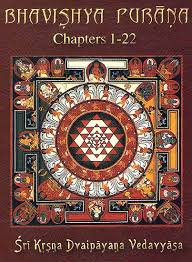Subgroups of Hinduism
•Ekasarana Dharma(37)
Items in Hinduism
1. Hinduism(Proper Noun-Masculine) One of the Trimurti, the three primary aspects of the divine in Hinduism. Other of the Trimurti are Brahma and Vishnu. In the Trimurti system, Brahma is the creator, Vishnu is the maintainer or preserver, and Shiva is the destroyer or transformer.
Shiva is usually worshipped as the Shiva linga. In images, he is generally represented as immersed in deep meditation or dancing the Tandava upon the demon of ignorance in his manifestation of Nataraja, the lord of the dance.
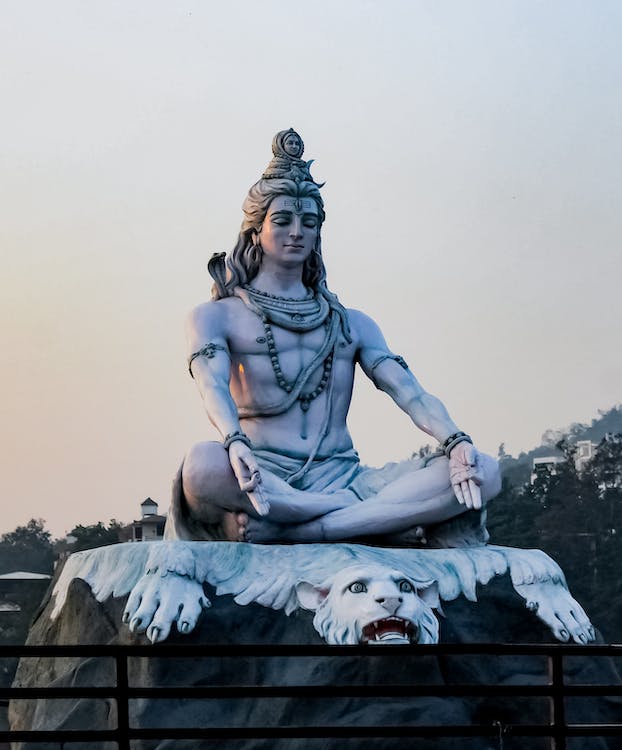
Assamese: অতিদেৱ, অদ্ৰিনাথ, অদ্ৰীশ, অনংগাৰি, অনলাক্ষ, অম্বিকানাথ, অসমনেত্ৰ, আদিনাথ, আশুতোষ, ইন্দু মৌলী, ইন্দুভূষণ, ইন্দুভৃত্য, ইন্দুমৌলি, ইন্দুশেখৰ, ইন্দুশেষৰ, ইন্দ্ৰনাথ, ইন্দ্ৰেশ্বৰ, ঈশান, উগ্ৰদেৱ, উগ্ৰেশ, উমাকান্ত, উমানন্দ, উমানাথ, উমাপতি, উমেশ, উৰগভূষণ, একনাথ, কন্দুকেশ্বৰ, কপালমালী, কপৰ্দী, কলাধৰ, কল্মাৰকন্ঠ, কাপালী, কামাখ্যানাথ, কালভক্ষ, কালযোগী, কালাৰি, কাশীনাথ, কাশীপতি, কাশীশ, কাশীশ্বৰ, কৃকৰ, কৃতজ্বৰ, কৃত্তিৱাস, কৃশাংগ, কেদাৰ, কেদাৰনাথ, কৈলাসনাথ, কৈলাসপতি, ক্ৰতুধ্বংসী, খগাভিৰাম, খটাংগধাৰী, খটাংগধৰ, খণ্ডপৰশু, গংগাধৰ, গিৰিজাকান্ত, গিৰিশ, গিৰীশ, গুড়াকেশ, গুৰাকেশ, গৌৰীনাথ, গৌৰীশ্বৰ, চণ্ডাপতি, চন্দ্ৰচূড়, চন্দ্ৰভূষণ, চন্দ্ৰমৌলি, চন্দ্ৰমৌলী, চন্দ্ৰশেখৰ, চন্দ্ৰিক, চন্দ্ৰিল, চেকিতান, চৰ্মবসন, জটাধাৰী, জটাধৰ্, জটীয়া, জলমূৰ্তি, জল্পেশ্বৰ, জ্বালাবক্ৰ, জ্বালী, টংকটিক, ডম্বৰুধৰ, তট, তাৰকনাথ, তাৰকেশ্বৰ, ত্ৰিনাথ, ত্ৰিনেত্ৰ, ত্ৰিনয়ন, ত্ৰিপুৰঘ্ন, ত্ৰিপুৰাৰি, ত্ৰিলোচন, ত্ৰিশূলধাৰী, ত্ৰিশূলী, ত্ৰ্যক্ষ, ত্ৰ্যম্বক, ত্ৰয়ীতনু, দাক্ষায়ণী পতি, দিকুকৰ, দিক্কৰ, দিগম্বৰ, দুৰ্গাধীশ, দুৰ্গাপতি, দুৰ্গেশ, দুৰ্গেশ্বৰ, দেৱপ্ৰিয়, দেৱাদিদেৱ, দেৱেন্দ্ৰনাথ, দেৱেশ, দ্ৰাপ, ধূৰ্জটি, ধূৰ্জতি, ধূৰ্জ্জটি, ধূৰ্জ্জুটি, নকুল, নটশেখৰ, নটেশ্বৰ, নটৰাজ, নন্দ্যেশ্বৰ, নীলকন্ঠ, নীলগ্ৰীৱ, পঞ্চানন, পশুপতি, পিনাকপাণি, পিনাকী, পুদগল, পুৰঞ্জয়, পুৰভিদ, পুৰমথন, পুৰুহৰ, প্ৰমথনাথ, প্ৰমথেশ, ফণীধৰ, ফণীভূষণ, বলিয়া-গোসাঁই, বহিৰেতা, বহ্নিৰেতাঃ, বাণেশ্বৰ, বিভূতিভূষণ, বিল্বেশ্বৰ, বিশ্বনাথ, বিশ্বেশ্বৰ, বিৰূপাক্ষ, বীৰেশ্বৰ, বৃষধ্বজ, বৃষভবাহন, বৈদ্যনাথ, ব্যোমকেশ, ভগনেত্ৰ, ভগনেত্ৰ-হাৰী, ভুৱনেশ্বৰ, ভূতনাথ, ভূতভাৱন, ভূদেৱ, ভৃংগেশ্বৰ, ভৈৰৱ, ভোলানাথ, ভৱানীকান্ত, ভৱানীপতি, ভৱেশ, মহাকাল, মহাদেৱ, মহানট, মহেশ, মহেশ্বৰ, মাৰজিৎ, মৃগাংকশেখৰ, মৃগাঙ্কমৌলি, মৃগাঙ্কশেখৰ, মৃত্যুঞ্জয়, যোগীন্দ্ৰ, যোগেশ, যোগেশ্বৰ, শংকৰ, শতঘ্ন, শম্ভু, শম্ভুনাথ, শশীভূষণ, শিৱ, শূলপাণি, শূলী, শেখৰ, শৈলজানন্দ, শ্ৰীকন্ঠ, শৰ্ব, সতীন্দ্ৰ, সতীপতি, সতীশ, সদাশিৱ, সিদ্ধদেৱ, সোমনাথ, সোমেশ্বৰ, স্মৰজিৎ, হিংগুলেশ্বৰ, হৰ, ৰংগনাথ, ৰামেশ্বৰ, ৰুদ্ৰ,
Bodo: सिब,
Karbi: hibo,
Dimasa: shibrai, shibarai,
Hindi: हर,
Nepali: नीलकन्ठ, महादेव,
Tiwa: Mahadeo
2. Hinduism(Abstract Noun) Visnu and Shiva united into one. বিষ্ণু আৰু শিৱৰ অভেদ যুগল মূৰ্ত্তি৷
3. Hinduism(Proper Noun-Masculine) One of the mythical characters of the epic Mahabharata. Even though he was a demon, he was affectionate and kind. Being the son of the Bheema and the demoness, Hidimbaa, he was a half demon. From his mother he learnt all the arts of the demons and from his father he inherited an affectionate and chivalrous temperament. He was an invaluable ally to the Pandavas in times of trouble, and appeared before them whenever they though of him.
As of 2007, Sun Animatics India is producing an animation movie on the story of Ghatotkacha (see image). ঘটোৎকচ মহাকাব্য মহাভাৰতৰ মতে হিড়িম্বা ৰাক্ষসীৰ পৰা হোৱা ভীমৰ পুতেক। মহাভাৰতত আধা ৰাক্ষস হোৱা স্বত্তেও তেওঁক মৰমিয়াল আৰু দয়ালু হিচাবে চৰিত্ৰায়ণ কৰা হৈছে|
আধুনিক বুৰঞ্জীবিদসকলৰ মতে ঘটোৎকচ আচলতে অসমৰ এজন কছাৰী বীৰ আছিল|ঘটোৎকচ যাদুবিদ্যাত পাৰ্গত আছিল বাবে বহুতে তেওঁক অসমৰ মায়ঙৰ লগত জড়িত কৰিব বিচাৰে|
২০০৭ চনত ঘটোৎকচৰ বিষয়ে এখন এনিমেছন কথাছবি বনোৱা হৈছে|
আধুনিক বুৰঞ্জীবিদসকলৰ মতে ঘটোৎকচ আচলতে অসমৰ এজন কছাৰী বীৰ আছিল|ঘটোৎকচ যাদুবিদ্যাত পাৰ্গত আছিল বাবে বহুতে তেওঁক অসমৰ মায়ঙৰ লগত জড়িত কৰিব বিচাৰে|
২০০৭ চনত ঘটোৎকচৰ বিষয়ে এখন এনিমেছন কথাছবি বনোৱা হৈছে|
4. Hinduism(Proper Noun-Masculine) Son of Lord Shiva and Parvati, Ganesh/Ganesha is one of the most worshipped Hindu deities. Revered as the god of wisdom and intellect and remover of obstacles.His elephant head makes it easier for him to be distinguished. হিন্দু বিশ্বাস অনুসৰি জ্ঞান, প্ৰজ্ঞা আৰু মেধাৰ দেৱতা৷ তেখেতক সকলো ধৰনৰ বিঘিনি নাশক বুলিও শ্ৰদ্ধা আৰু পূজা কৰা হয়৷ তেওঁ শিৱ আৰু পাৰ্বতীৰ সন্তান৷ তেখেত হাতীমূৰীয়া৷
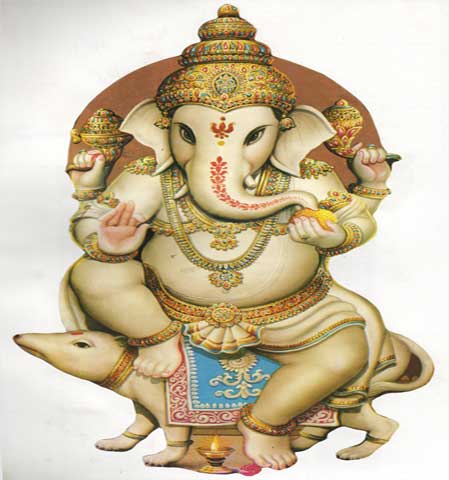
Assamese: অম্বিকেয়, একদংষ্ট্ৰ, একদন্ত, কুঞ্জৰবদন, গজানন, গণদেৱতা, গণনাথ, গণনায়ক, গণপতি, গণাধিপ, গণেশ, দ্বিদেহ, পাৰ্বতীনন্দন, বিঘ্ননাশক, বিঘ্ননাশন, বিঘ্ননায়ক, বিঘ্নবিনায়ক, বিঘ্নহাৰী, বিঘ্নহৰ, বিঘ্নেশ, বিঘ্নেশ্বৰ, বিঘ্নৰজা, বিঘ্নৰাজ, বিনায়ক, লম্বোদৰ, সিদ্ধিদাতা, হেৰম্ব, হেৰেম্ব,
Dimasa: Gonesh,
Bangla: গণেশ
5. Hinduism(Proper Noun-Feminine) the goddess of wealth according to Hindu faith. Wife of Lord Vishnu and daughter of Lord Shiva and Parvati, thus sister of Ganesh and Saraswati. হিন্দু বিশ্বাস অনুসৰি ধন সম্পত্তিৰ দেৱী৷ ভগৱান বিষ্ণুৰ পত্নী৷
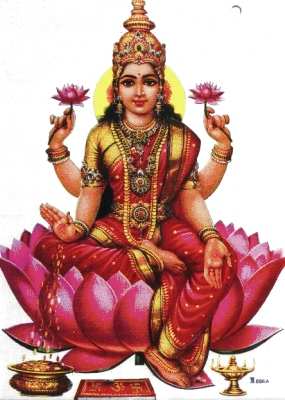
Assamese: অচলা, অজিতবল্লভা, অনুশ্ৰী, অম্বুজা, ইন্দিৰা, কমলা, কমলালয়া, কমলাসনা, কমলিকা, কাৱ্যশ্ৰী, ক্ষীৰাব্ধিজা, চক্ৰিকা, জয়ন্তী, জলনিধিজা, ধনদা, নাৰায়ণী, পদ্মা, পদ্মালয়া, লক্ষ্মী, লখিমী, শতদলবাসিনী, হৰিনেত্ৰনিৱাসিনী, হৰিপ্ৰিয়া, ৰমা,
Bodo: लोक्षी,
Mising: ko:je-yanggo,
Bangla: লক্ষ্মী,
Deori: মিনুচি, লকি
6. Hinduism(Proper Noun) A great Epic of Hindu religion. হিন্দু ধৰ্মৰ এখন মহাকাব্য ।
Assamese: ৰামায়ণ
Related Idea:
a. Proper Noun-Masculine: Raghuvir, Ram, Ramachandra, অৱধেশ, কপিৰথ...b. Proper Noun-Feminine: Sita, ঈষা, কন্নকী, জনক নন্দিনী, জানকী...
c. Proper Noun-Masculine: Ravan, দশগ্ৰীৱ, দশমুখ, দশমুণ্ড, দশস্কন্ধ...
d. Proper Noun-Masculine: Dasarath, দশৰথ, दसरत...
7. HinduismRiver(Proper Noun) [a] As per Hindu mythology, a river in The Heaven
[b] Mandakini is a tributary of river Alaknanda. Mandakini originates from the Charabari glacier near Kedarnath in Uttarakhand, India. Mandakini is fed by river Vasukiganga at Sonprayag. Mandakini joins Alaknanda at Rudraprayag. Alaknanda then proceeds towards Devaprayag where it joins with Bhagirathi River to form the Ganges. সৰ্গত থকা গঙ্গা নদী
[b] Mandakini is a tributary of river Alaknanda. Mandakini originates from the Charabari glacier near Kedarnath in Uttarakhand, India. Mandakini is fed by river Vasukiganga at Sonprayag. Mandakini joins Alaknanda at Rudraprayag. Alaknanda then proceeds towards Devaprayag where it joins with Bhagirathi River to form the Ganges. সৰ্গত থকা গঙ্গা নদী
8. Hinduism(Proper Noun-Feminine) The supreme goddess in Hinduism. She is considered to be the root cause of creation, preservation and annihilation. She is also the fiercer, demon-fighting form of Shiva's wife, goddess Parvati.
হিন্দু ধৰ্মৰ এগৰাকী প্ৰধান উপাস্য দেৱী। হিন্দু বিশ্বাস অনুসৰি সৃষ্টি, সংৰক্ষণ আৰু ধ্বংসৰ মূল কাৰক আৰু শিৱৰ ভাৰ্য্যা পাৰ্বতীত দানৱ দমনকাৰী হিংসুক ৰূপ।
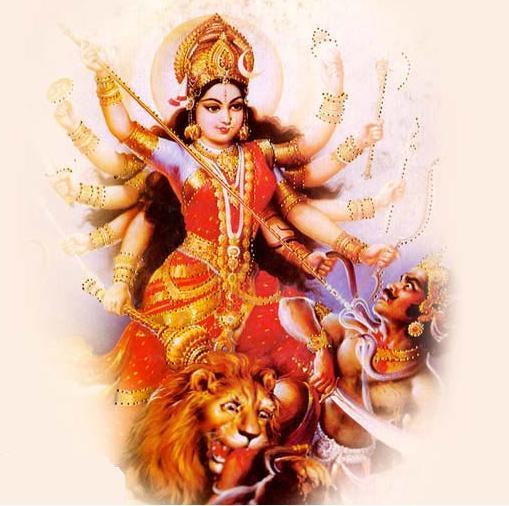
Assamese: অগসুতা, অগাত্মজা, অচল কন্যা, অতসী পুষ্পবৰ্ণাভা, অদ্ৰিজা, অদ্ৰিতনয়া, অনাদ্যা, অনিকা, অন্নদা, অপৰ্ণা, অম্বা, অম্বালিকা, অম্বিকা, আদিদেৱী, আদিভূতা, আদ্যশক্তি, আদ্যা, আদ্যাশক্তি, আনন্দময়ী, আৰ্যা, ঈশানী, ঈশ্বৰী, উমা, একানংশ, ঐশানী, কপৰ্দিনী, কাণ্ডবাৰিণী, কাত্যায়নী, কামাক্ষী, কুণ্ডলিনী, কুৰ্বুৰী, কৈলাসবাসিনী, কোটৰী, কৌশিকী, কৰ্ৱৰী, গিৰিজা, গিৰিনন্দিনী, গিৰিবালা, গৌতমী, গৌৰী, চণ্ডিকা, চণ্ডী, চণ্ডৱতী, চামুণ্ডা, জগজ্জননী, জগতজননী, জগদম্বা, জগদ্ধাত্ৰী, জগন্মাতা, জগন্ময়ী, জ্বালামালিনী, জয়ন্তী, জয়া, তামসী, তাৰিণী, ত্ৰিগুণা, ত্ৰিদশেশ্ৱৰী, ত্ৰিনয়না, ত্ৰিনয়নী, ত্ৰিশূলধাৰিণী, ত্ৰিশূলিনী, দক্ষকন্যা, দক্ষজা, দনুজদলনী, দশপ্ৰহৰণধাৰিণী, দশভুজা, দাক্ষায়ণী, দানৱদলনী, দুৰ্গা, নন্দা, নিস্তাৰিণী, পাৰ্বতী, পৰমা প্ৰকৃতি, পৰমেশ্বৰী, বগলা, বগলা দেৱী, বভ্ৰৱী, বাভ্ৰৱী, বাসন্তী, বিজয়া, বিশ্বেশ্বৰী, ভগৱতী, ভদ্ৰকালী, ভদ্ৰাণী, ভাস্বতী, ভুৱনেশ্বৰী, ভৈৰৱী, ভৱতাৰিণী, ভৱানী, মংগলা, মঙ্গলচণ্ডী, মহাদেৱী, মহাবিদ্যা, মহামায়া, মহাশক্তি, মহিষাসুৰমৰ্দিনী, মহীষমৰ্দিনী, মহেশানী, মহেশী, মহেশ্বৰী, মৃড়ানী, মোক্ষদা, শংকৰী, শাকম্ভৰী, শাৰদা, শিখৰবাসিনী, শিৱপত্নী, শিৱপ্ৰিয়া, শিৱানী, শুভংকৰী, শুভদাচণ্ডী, শূলিনী, শৈলজা, শৰণ্যা, শৰ্বানী, সনাতনী, সাত্ত্বিকী, সিংহবাহিনী, সুৰেশ্বৰী, সৰ্বজয়া, সৰ্বমংগলা, সৰ্বাণী, সৰ্বাৰ্থসাধিকা, সৰ্ব্বাণী, হিমানী, হৈমৱতী, ৰাজৰাজেশ্বৰী, ৰুদ্ৰাণী,
Bodo: दुर्गा,
Dimasa: Durga, gamadi, Matingma,
Bangla: দুর্গা
Related Idea:
a. Proper Noun: Maha Nabami, Nabami, নৱমী, মহানৱমী...b. Abstract Noun: Bijoya Dashami, Dasara, Dashain, Dashami, Dussehra...
9. Hinduism(Verbal Noun) the act of putting ceremonial fire on the face of the corpse before lighting the funeral pyre. চিতাত জুই লগোৱাৰ আগেয়ে শৱৰ মুখত জুই দিয়া কাৰ্য
10. Hinduism(Proper Noun-Masculine) One of the principal Hindu deities হিন্দু ধৰ্মৰ তিনিজন প্ৰধান উপাস্য দেৱতাৰ মাজৰ এজন৷
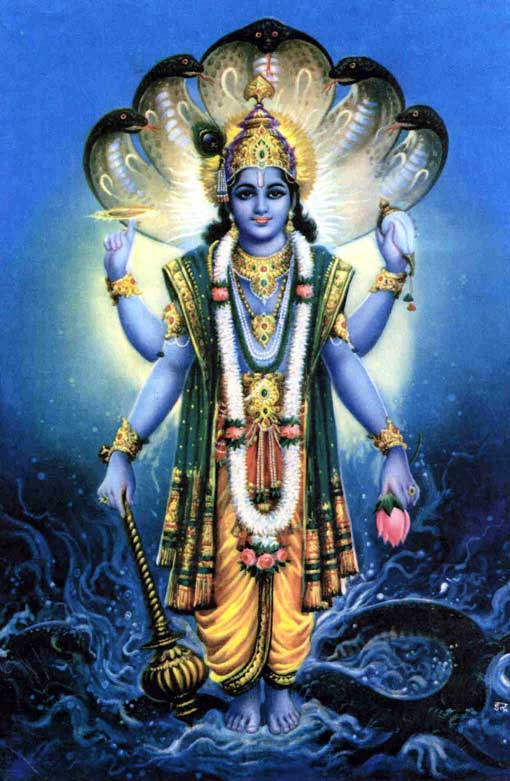
Assamese: অচ্যুত, অজিতেশ, অনন্ত-শয়ন, অমিতাশন, অমৃতশেয়, অৰবিন্দ-লোচন, আদিবৰাহ, ইন্দ্ৰকৰ্মা, ঈপতি, উৰুক্ৰম, উৰুগায়, কঞ্জনাভ, কমললোচন, কমলাকান্ত, কমলাপতি, কামেশ্বৰ, কুন্দ, কুন্দৰ, কুমোদক, কুস্তভ, কূৰ্মৰাজ, কৌস্তভবক্ষ, খগাসন, খগেন্দ্ৰধ্বজ, গোলোকপতি, গোলোকেশ্বৰ, গড়ুৰকেতু, গৰুড় বাহন, গৰুড়-ধ্বজ, চক্ৰধাৰী, চক্ৰধৰ, চক্ৰপাণি, চক্ৰায়ুধ, চক্ৰেশ্বৰ, চতুষ্কৰ, চতুৰ্বাহু, চতুৰ্ভুজ, জয়পাল, ত্ৰৈলোকনাথ, ত্ৰৈলোক্যেশ্বৰ, দনুজদমন, দনুজাৰি, দানৱাৰি, দাৰুণ, দীন-দয়াল, দৈতাৰি, দৈত্যনিসূদন, দৈত্যাৰি, ধৰণীশ্বৰ, ধৰ্মনাভ, নাৰায়ণ, পদ্মধৰ, পদ্মনাভ, পদ্মপাণি, পদ্মলোচন, পদ্মেশ, পাষণ্ডমৰ্দ্দন, পাৰায়ণ, পুণ্ডৰীকাক্ষ, পুৰুষোত্তম, বলিন্দম, বলিসূদন, বিশ্বম্ভৰ, বিষ্ণু, বৈকুণ্ঠনাথ, বৈকুণ্ঠপতি, ভুৱনমোহন, মধুদ্বিষ, মধুসূদন, মধুৰিপু, মন্দৰধাৰী, মাধৱ, মুৰনাশী, মুৰমথন, লক্ষীকান্ত, লক্ষ্মীকান্ত, লক্ষ্মীনাথ, লক্ষ্মীনাৰায়ণ, লক্ষ্মীন্দ্ৰ, লক্ষ্মীপতি, লক্ষ্মীশ্বৰ, লোকনাথ, শংখধৰ, শংখপাণি, শাৰংগধৰ, শাৰংগপাণি, শাৰঙ্গপাণি, শিপিৱিষ্ট, শ্ৰীকান্ত, শ্ৰীধৰ, শ্ৰীনাথ, শ্ৰীনিবাস, শ্ৰীপতি, সত্যনাৰায়ণ, হৰি, ৰবিলোচন, ৰমাকান্ত, ৰমাপতি, ৰমেশ,
Bodo: बिष्णु,
Bangla: বিষ্ণু
Related Idea:
a. Proper Noun-Masculine: garuda, অৰ্ক্ষ্য, কশ্যপনন্দন, কামায়ু, কাশ্যপেয়...
11. HinduismPlace(Proper Noun-Neuter) a rocky island in the midst of the Brahmaputra river at Guwahati and the temple of Siva on the top of it. গুৱাহাটীৰ ওচৰত ব্ৰহ্মপুত্ৰৰ মাজত থকা এটা পৰ্বত আৰু তাৰ ওপৰত থকা শিৱলিংগ৷
12. CustomsHinduism(Verbal Noun) the ceremony of investing a boy with the sacred thread. ল’ৰাক প্ৰথমতে লগুণ দিয়া বা প্ৰথমে লগুণ পিন্ধোৱা কাৰ্য্য ৷
13. Hinduism(Proper Noun-Masculine) one incarnation of Lord Vishnu, after Lord Ram and before Lord Buddha. He is a central deity in the 'Mahabharat'. ভগৱান বিষ্ণুৰ এক অৱতাৰ৷
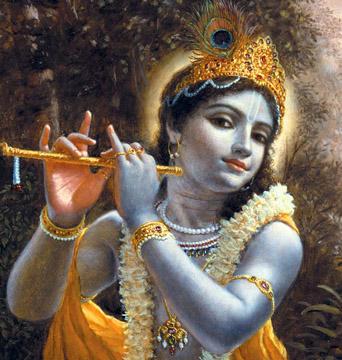
Assamese: অচ্যুত, অটলবিহাৰী, অধোক্ষজ, অনংগমোহন, অনন্তবীৰ্য, উদ্ধৱবন্ধু, কংসহা, কংসাৰি, কলীয়া, কানাই, কানু, কালীয়দমন, কৃষ্ণ, কেশি-নিষূদন, কেশীমথন, কেশৱ, গদাধৰ, গদাপাণি, গিৰিধাৰী, গিৰিধৰ, গোকুলনাথ, গোকুলপতি, গোকুলেশ্বৰ, গোপবল্লভ, গোপাল, গোপিকান্ত, গোপিকামোহন, গোপিকাৰমণ, গোপিনীবল্লভ, গোপীচন্দ্ৰ, গোপীনাথ, গোপীমোহন, গোপেন্দ্ৰ, গোবৰ্ধনধাৰী, গোষ্ঠপতি, গোষ্ঠবিহাৰী, গোৱিন্দ, ঘনশ্যাম, চানুৰমৰ্দন, জনাৰ্দন, ত্ৰিভংগমুৰাৰি, দামোদৰ, দীনবন্ধু, দৈৱকীনন্দন, দ্বাৰকাধীশ, দ্বাৰকানাথ, দ্বাৰকাপতি, দ্বাৰকামোহন, দ্বাৰকাৰঞ্জন, দ্বাৰকেশ, দ্বাৰিকানাথ, দ্বাৰিকাপতি, নগধৰ, ননীচোৰ, নন্দদুলাল, নন্দদুল্লাল, নীলমাধৱ, নৰকান্তক, নৰনাৰায়ণ, পাণ্ডৱসখা, পাৰ্থসাৰথি, পীতাম্বৰ, পুণ্ডৰীকাক্ষ, পুলিনবিহাৰী, পৃশ্মিগৰ্ভ, পৃশ্মিহৰি, বংশীগোপাল, বংশীধৰ, বংশীবদন, বন-বিহাৰী, বনমালী, বনোৱাৰী, বাসুদেৱ, বিপিনবিহাৰী, বৃন্দাবনেশ্বৰ, বৃষ্ণি, বেণুধৰ, ব্ৰজকিশোৰ, ব্ৰজদুলাল, ব্ৰজনাথ, ব্ৰজবল্লভ, ব্ৰজবিহাৰী, ব্ৰজভূষণ, ব্ৰজমোহন, ব্ৰজেন্দ্ৰ, ব্ৰজেশ, মথুৰাপতি, মথুৰেশ, মদনগোপাল, মদনমোহন, মধুসুধন, মুকুন্দ, মুৰ-ৰিপু, মুৰাৰি, মুৰাৰু, মুৰুলীধৰ, যজ্ঞেশ, যদুনন্দন, যদুনাথ, যদুপতি, যদুমণি, যশোদাদুলাল, যশোদানন্দন, যাদৱ, যাদৱৰায়, শকটাৰি, শ্যাম, শ্যামকানু, শ্যামসুন্দৰ, শ্যামৰায়, শ্ৰীকৃষ্ণ, শ্ৰীহৰি, সাৰঙ্গধৰ, সাৰঙ্গপাণি, হৃষীকেশ, ৰণচোড়, ৰময়া, ৰাধা-কান্ত, ৰাধানাথ, ৰাধাবল্লভ, ৰাধামাধব, ৰাধামাধৱ, ৰাধাৰমণ, ৰাসবিহাৰী, ৰাসেশ্বৰ,
Bodo: कृष्ण,
Bangla: কৃষ্ণ, কৃষ্ণা
Related Idea:
a. Proper Noun-Feminine: Anuradha, অনুৰাধা...b. Proper Noun: Jhulan yatra, জুলন-যাত্ৰা, ঝুলন-যাত্ৰা, jejot keyot, julon jatra...
14. FestivalHinduism(Proper Noun) Hindu festival celebrating the end of the monsoon; held in October/November of english calendar and either in Aahin or Kati month of Assamese calendar, celebrations feature lights, lamps and sometimes fireworks. আহিন বা কাতি মাহৰ অমাৱস্যা তিথিত ঘৰ আৰু পদূলিত বহুত চাকি লগাই পতা উৎসৱ ।
Assamese: দীপান্বিতা, দীপালী, দীপাৱলী, দেৱালি, ধূপালী, ধূপাৱলী,
Dimasa: dewali,
Bangla: দিওয়ালি, দীপাবলী
15. Hinduism(Proper Noun-Masculine) the third brother of the Pandavas; the greatest archer of his time. পঞ্চপাণ্ডৱৰ তৃতীয় ভ্ৰাতৃ৷ এখেতৰ দেৱপিতৃ ইন্দ্ৰদেৱ আৰু মাক কুন্তী৷ তেওঁ ’মহাভাৰত’ৰ সময়ত সৰ্বশ্ৰেষ্ঠ ধনুধৰ আছিল৷ দুয়োহাতে সমানে ধনু চলাব পাৰিছিল বাবে তেওঁক সব্যসাচী বুলিও কয়৷
Assamese: অৰ্জুন, অৰ্জ্জুন, কপিকেতন, কপিধ্বজ, কিৰীটী, গাণ্ডীৱধন্বা, জিষ্ণু, ধনঞ্জয়, পাৰ্থ, ফাল্গুনি, বীভৎসু, বৃহন্নলা, শ্বেতবাহ, শ্বেতবাহন, সব্যসাচী,
Bodo: अर्जुन
16. PersonalitiesHinduism(Proper Noun-Masculine) Parashuram is sixth incarnation of Lord Vishnu, born as the son of the sage-couple, Jamadagni and Renuka. He exterminated the Kshatriyas (race of kings) led by Kartavirya, who were oppressing the people.Parashuram was asked by the holy rishis (seers) to make a gift of land to brahmins in order to absolve him of the sin of killing the Kshatriyas. বিষ্ণুৰ ষষ্ঠ অৱতাৰ, জমদগ্নি ঋষিৰ আৰু ৰেণুকাৰ পুতেক আৰু ক্ষত্ৰিয়বিলাকক দমন কৰোঁতা ৷
Assamese: জামদগ্নি, জামদাগ্নেয়, জামদাগ্ন্য, পৰশুৰাম, ভাৰ্গৱ, ভৃগুপতি, ভৃগুসুত,
Bangla: পরশুরাম
17. Hinduism(Proper Noun-Masculine) Lord Ram (Ramachandra) is the seventh incarnation of Lord Vishnu,he is the hero of the epic Ramayana. Ram, Hi is son of Dasaratha king of Ajudha. Hi is usually pictured as holding a bow and arrow, indicating his readiness to destroy evils. বিষ্ণুৰ সপ্তম অৱতাৰ, ৰামচন্দ্ৰ অয়োধ্যাৰ ৰজা দশৰথৰ পুতেক আৰু ৰামায়নৰ প্ৰধান নায়ক ৷
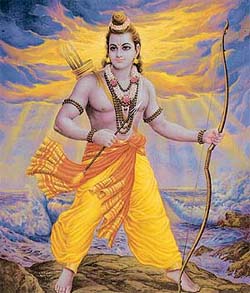
Assamese: অৱধেশ, কপিৰথ, কৌশল্যানন্দন, কৌশল্যায়ন, কৌশল্যেয়, জানকীনাথ, জানকীবল্লভ, দশৰথ নন্দন, দাশৰথ, দাশৰথি, মৰ্যাদা-পুৰুষোত্তম, শ্ৰীৰাম, শ্ৰীৰামচন্দ্ৰ, সীতাকান্ত, সীতানাথ, সীতাপতি, ৰঘুকুলতিলক, ৰঘুকুলনন্দন, ৰঘুকুলপতি, ৰঘুনন্দন, ৰঘুনাথ, ৰঘুপতি, ৰঘুবীৰ, ৰঘুবৰ, ৰঘুমণি, ৰাঘৱ, ৰাজীৱলোচন, ৰাম, ৰামচন্দ্ৰ, ৰাৱণাৰি,
Bodo: रेम,
Dimasa: Ram, Ramsondra,
Nepali: जानकीनाथ, जानकीबल्लभ, दशरथनन्दन, रघुनाथ, रघुपति, राघव, राम, रामचन्द्र
Related Idea:
a. Proper Noun: Ramayana, ৰামায়ণ...b. Proper Noun-Feminine: Sita, ঈষা, কন্নকী, জনক নন্দিনী, জানকী...
18. Hinduism(Proper Noun-Masculine) the elder brother of Sri Krishna, Balram is the eighth incarnation of Lord Vishnuis. শ্ৰীকৃষ্ণৰ জেষ্ঠ ককায়েক বলৰাম হৈছে বিষ্ণুৰ অষ্টম অৱতাৰ৷
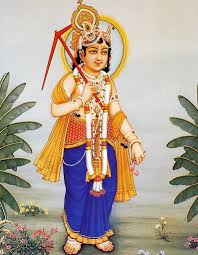
Assamese: অনন্ত, এককুণ্ডল, তালধ্বজ, তালাংক, নীলাম্বৰ, বলদেৱ, বলভদ্ৰ, বলাই, বলী, বলোভদ্ৰ, বলৰাম, মুষলী, লাঙ্গলী, সিতাসিত, সীৰপাণি, সীৰা, হলধৰ, হলায়ুধ, হলিৰাম, হলী, ৰেৱতীকান্ত, ৰেৱতীমোহন, ৰেৱতীৰমণ, ৰৌহিণেয়,
Bodo: बलोराम
19. Hinduism(Proper Noun) A cave with a Siva dham where artificial "Siva Ling" is made up of ice. It is situated in the northern Kashmir of the Himalayas. উত্তৰ কাশ্মীৰত অৱস্থিত অমৰনাথ গুহা এখন শিৱস্হান৷ ইয়াক বৰফানি বাবা বুলিও কোৱা হয়৷ কিয়নো ইয়াত জুন, জুলাই আৰু আগস্ট মাহত কৃত্ৰিম বৰফৰ শিৱলিংগৰ উত্পতি হয়৷ ই হিন্দুৰ এখন তীৰ্থস্হান৷
20. Hinduism(Proper Noun-Masculine) Elder son of the lord Siva. A beautiful God among all the gods. শিৱৰ বৰপুত্ৰ ৷ সকলো দেৱতাৰ ভিতৰতে দেখিবলৈ ধুনীয়া ৷
Assamese: অগ্নিকুমাৰ, অগ্নিজ, অগ্নিভূ, অম্বিকেয়, আম্বিকেয়, কাৰ্তিকেয়, কাৰ্ত্তিক, কুমাৰ, কৃত্তিকাসুত, ক্ৰৌঞ্চাৰতি, গুহ, তাৰকজিৎ, তাৰকাৰি, তাৰহা, নমুচি, বহিৰ্বাহন, বহুলেয়, বিশাখ, শক্তিধৰ, শক্তিপাণি, শিখিধ্বজ, শিখিবাহন, শৰজ, শৰজন্মা, ষাণ্মাতুৰ, ষড়ানন, সুব্, স্কন্দ,
Bodo: कारथिक,
Dimasa: Kartik
21. Hinduism(Proper Noun-Masculine) Ravana was ten-headed, twenty-armed mythical king of ancient Sri Lanka. with great supernatural power, who is said to have ruled Lanka about 6000 years ago. He plays a major role in Hindu mythology, especially in the Ramayana, where he is mainly depicted negatively as a brute, and most infamously as having kidnapped Rama's wife Sita and being killed by her husband. ৰামায়নত থকা লংকাৰ এজন ৰাক্ষসৰ ৰজা৷ দহটা মূৰ আৰু বিশখন হাত আছিল আৰু সীতাক অপহৰণ কৰাৰ বাবে ৰামচন্দ্ৰৰ হাতত মৃত্যু হয়৷

Assamese: দশগ্ৰীৱ, দশমুখ, দশমুণ্ড, দশস্কন্ধ, দশানন, দশাস্য, ধনদানুজ, লংকাধিপতি, লংকাপতি, লংকেশ, লংকেশ্বৰ, লঙ্কেশ, ৰাক্ষসেন্দ্ৰ, ৰাক্ষসেশ্বৰ, ৰাৱণ,
Bodo: राबन
Related Idea:
a. Proper Noun: Ramayana, ৰামায়ণ...
22. Hinduism(Proper Noun-Masculine) Dasaratha in Hindu mythology is the king of Ayodhya and a descendant of Raghuvamsa. He is the father of Lord Rama, the heroic prince who is considered an avatar of Vishnu in the epic Ramayana. সূৰ্যবংশীয় এজন অযোধ্যাৰ ৰজা আৰু ৰামচন্দ্ৰৰ বাপেক৷
23. Religious-MythologicalHinduism(Proper Noun-Feminine) Sita is the wife of Rama the principal characters in the Ramayana, Sita was a foundling, discovered in a furrow in a ploughed field, and for that reason is regarded as a daughter of Bhudevi, the Goddess Mother Earth. She was found and adopted by Janaka, king of Mithila. মিথিলাৰ ৰজা জনকৰ (তোলনীয়া)জীয়েক আৰু ৰামচন্দ্ৰৰ ভাৰ্যা৷ জনক ৰজাই নাঙলৰ সীৰলুত সীতাক লাভ কৰে৷
Assamese: ঈষা, কন্নকী, জনক নন্দিনী, জানকী, ধৰণীসুতা, ধৰাত্মজা, পাৰ্থিৱী, বৈদেহী, ভূ-পুত্ৰী, মৈথিলী, সীতা, ৰাঘৱপ্ৰিয়া,
Bodo: सीता,
Karbi: Hita, purthimi Kungripi,
Dimasa: Sita,
Bangla: সীতা,
Nepali: ईशा, जनक नन्दिनी, जानकी, राघवप्रिया, सीता
Related Idea:
a. Proper Noun-Masculine: Raghuvir, Ram, Ramachandra, অৱধেশ, কপিৰথ...b. Proper Noun-Masculine: Janaka, জনক, মিথিলাৰাজ, Jonok...
c. Proper Noun: Ramayana, ৰামায়ণ...
24. MusicHinduism(Material Noun-Neuter) Indian Musical Instrument Damaru is the most common hour-glass drum in India. There are two drumheads on each side of the resonator which are laced together with cord. Near the centre of the lacing are two loose knoted cords. The knots on each end strike both heads to produce a rattling sound. Damru is one of the attributes of several deities and gods (of Hindus), particularly of Shiva. মাজ চিঞা আৰু দুই মূৰ ঘুৰণীয়া আৰু ছালেৰে ছোৱা এবিধ ভাৰতীয় বাদ্য৷ তাক এহাতে লৈ জোকাৰিলে মাজতে জৰীৰে ওলমাই দিয়া এটা বা দুটা গুটিয়ে দুই মূৰে আঘাত কৰি শব্দ কৰে৷ হিন্দু ধৰ্মৰ দেৱতা শিৱৰ এবিধ প্ৰধান বাদ্য৷
25. FestivalHinduism(Proper Noun) the nine lunar day of the bright fortnight and penultimate day of Dugra puja. আহিন মাহৰ শুক্ল পক্ষৰ নৱমদিনৰ তিথি৷ দুৰ্গা পূজাৰ চতুৰ্থ দিন।
Assamese: নৱমী, মহানৱমী
Related Idea:
a. Proper Noun-Feminine: Durga, অগসুতা, অগাত্মজা, অচল কন্যা, অতসী পুষ্পবৰ্ণাভা...
26. FestivalHinduism(Abstract Noun) A Hindu festival that celebrates the victory of good over evil. It is a gazetted holiday in India, which is marked on the 10th day of the bright half (Shukla Paksha) of the month of Ashvin (Ashwayuja), according to the Hindu calendar. Colorful Ravana head effigies are burned on this day. আহিন মাহৰ শুক্ল পক্ষৰ দশমদিনৰ তিথি৷ দুৰ্গা পূজাৰ শেষ দিন।
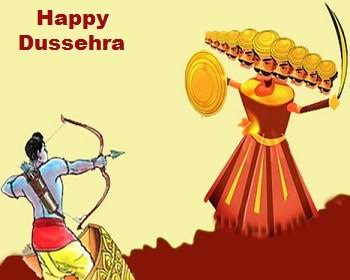
Assamese: দশমী, দশহাৰা, দশেৰা, বিজয়া দশমী, মহাদশমী
Related Idea:
a. Proper Noun-Feminine: Durga, অগসুতা, অগাত্মজা, অচল কন্যা, অতসী পুষ্পবৰ্ণাভা...
27. PersonalitiesLiteratureHinduism(Proper Noun-Masculine) A fourteenth century Assamese poet and the best before Sankardeva. He translated into Assamese the Ramayana of Valmiki in verse format (Kotha Ramayana). This is supposed to be the first amomg the modern Indian Aryan languages. শঙ্কৰদেৱে পূৰ্বকবি অপ্ৰমাদী আখ্যা দিয়া মাধব কন্দলি(চতুৰ্দশ শতিকা) প্ৰাকশঙ্কৰী যুগৰ শ্ৰেষ্ঠ কবি৷বৰাহী কবি মহামাণিক্যৰ পৃষ্ঠপোষকতাত তেওঁ বাল্মিকীৰ ৰামায়ণ অসমীয়ালৈ অনুবাদ কৰিছিল৷তেওঁৰ ৰচনাখন আধুনিক ভাৰতীয় আৰ্যভাষাসমূহৰ ভিতৰত প্ৰথম ৰচনা বুলি ধৰা হয়৷
28. Hinduism(Proper Noun-Masculine) A supernatural eagle-like being that serves as Vishnu's mount. It has body like human being with beak and wing similar to the Eagle. It is known to be the king of birds and eats snakes. মানুহৰ দৰে হাত-ভৰি আৰু ঈগলৰ দৰে ঠোঁট আৰু ডেউকা থকা এজন দেৱতা ৷ ইয়াক চৰাইৰ ৰজা বুলি কোৱা হয় আৰু সাপ খায় ৷ বিষ্ণুৰ বাহন ৷
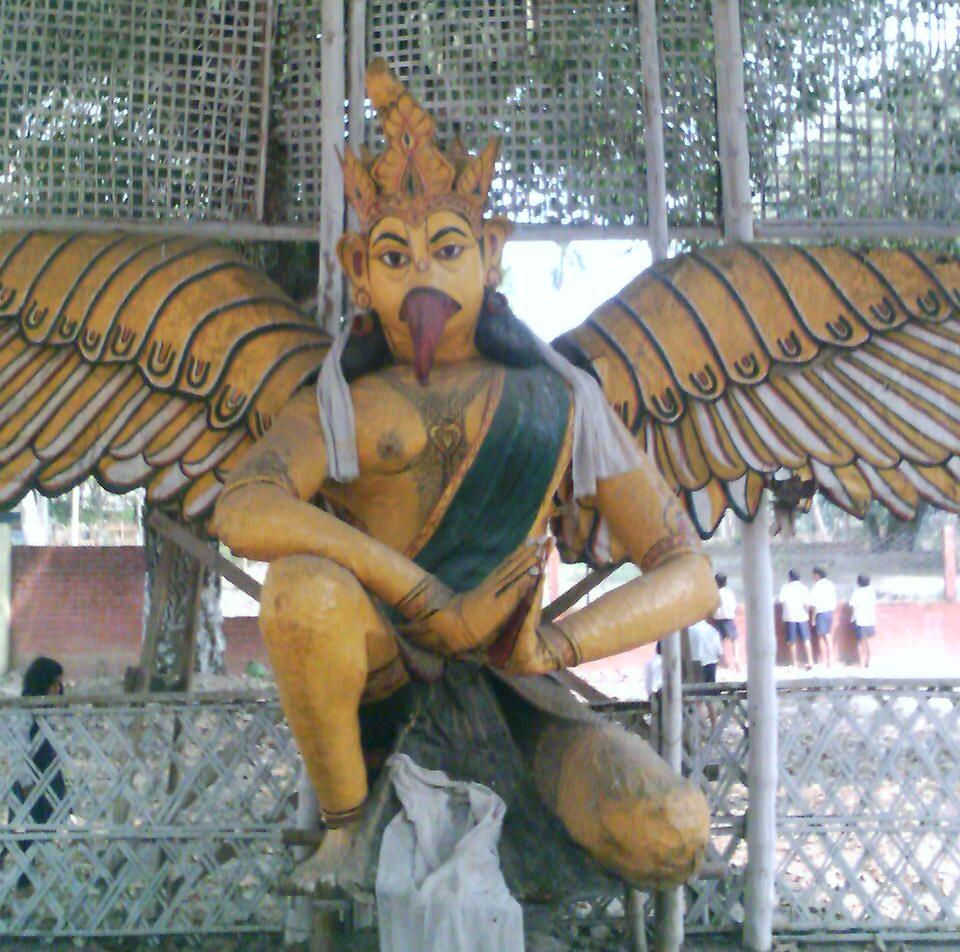
Assamese: অৰ্ক্ষ্য, কশ্যপনন্দন, কামায়ু, কাশ্যপেয়, খগপতি, খগাধিপ, খগেন্দ্ৰ, খগেশ্বৰ, খগৰাজ, গৃধ্ৰ, গৃধ্ৰৰাজ, গৰুণ, গৰুণ্ড, গৰুত্মান, গৰুড়, গৰুড়পক্ষী, তাৰ্ক্ষপুত্ৰ, পক্ষীন্দ্ৰ, পক্ষীৰাজ, পতগ, পতত্ৰীৰাজ, পন্নগাশন, বিনতানন্দন, বিষ্ণুবাহন, বৈনতেয়, সিতানন, সুপৰ্ণ, সৌপৰ্ণ, স্বৰ্ণপক্ষ, সৰ্পভুক, সৰ্পাশন
Related Idea:
a. Proper Noun-Masculine: Vishnu, অচ্যুত, অজিতেশ, অনন্ত-শয়ন, অমিতাশন...
29. Hinduism(Proper Noun-Masculine) One of the strongest characters of the Mahabharata. He was the grandfather of both the Pandavas and the Kauravas. Bhishma, who was Commander-in-Chief of the Kaurava forces in the Mahabharata war, was 126 years old at the time. He lived a pure celibate life, making a great sacrifice for the sake of his father. মহাভাৰতৰ অন্যতম শক্তিশালী চৰিত্ৰ৷ তেওঁ কৌৰৱ-পাণ্ডৱ উভয়ৰে ককাক আছিল৷ মহাভাৰতৰ যুদ্ধত কৌৰৱৰ সেনাপতি হোৱাৰ সময়ত তেওঁৰ বয়স আছিল ১২৬ বছৰ৷ তেওঁ নিজৰ পিতৃৰ স্বাৰ্থত ওৰেটো জীৱন অবিবাহিত হিছাপে অতিবাহিত কৰিছিল৷

Assamese: গঙ্গাপুত্ৰ, গঙ্গাসুত, গাংগায়নি, গাংগেয়, দেৱব্ৰত, ভীষ্ম, শান্তনৱ
Related Idea:
a. Abstract Noun: mahabharata, পঞ্চমবেদ, মহাভাৰত, মহাভারত...
30. HinduismPlace(Proper Noun) A temple, located in the south-east corner of Guwahati city is a Shiva mandir constructed by Ahom King Rajeswar Singha along with gift of land 835 Bighas for the ashram. The history of the Basistha Ashram where the temple is located dates back to the Vedic age. According to legend the ashram was founded by the great saint Basistha (Vasishtha).
31. HinduismPlace(Proper Noun) A Shiva Temple located near Panbazar locality on the bank of the River Brahmaputra.The present temple was constructed by the Ahom King Pramatta Singha (C1720AD).
32. HistorialHinduismPlace(Proper Noun) A Temple located near Guwahati in Assam.. As per the description of The KALIKA PURANA, Lord Brahma created planets and other heavenly bodies from this site.The temple with the images of the nine planets (Nabagraha) is believed to be an ancient seat of study of asstrology and astronomy. Ahom King Rajeswar Singha constructed the existing temple in 1752AD. নৱগ্ৰহ মন্দিৰ অসমৰ গুৱাহাটী মহানগৰৰ চিত্ৰাচল পাহাৰ (নৱগ্ৰহ পাহাৰ)ত থকা এক প্ৰাচীন মন্দিৰ৷ ইয়াত সূৰ্য্যকে ধৰি নটা গ্ৰহৰ শিলাচিহ্ন আছে৷ ইয়াত থকা বিভিন্ন গ্ৰহৰ শিলাচিহ্নবোৰ হ’ল- সূৰ্য্য, চন্দ্ৰ, মঙ্গল, ৰাহু, শনি, কেতু, বৃহস্পতি, বুধ আৰু শুক্ৰ৷ মন্দিৰত দৈনিক নৱগ্ৰহৰ পূজা-পাতল হোৱাৰ উপৰিও প্ৰতি বছৰে মাঘ-ফাগুনৰ সংক্ৰান্তিত মহা সমাৰোহেৰে তিনিদিনীয়াকৈ মহাযজ্ঞ অনুষ্ঠিত হয়৷ এই মন্দিৰত কোনো বলি-বিধানৰ ব্যৱস্থা নাই যদিও ছাগলী, হাঁহ, পাৰ আদি উছৰ্গা কৰাৰ উপৰি ব্যক্তিগত যাগ-যজ্ঞ হোম আদি কৰা হয়৷
33. HinduismPlace(Proper Noun) A famous Krishna temple, situated in North Guwahati. The temple has two idols, i.e. of Lord Shyamaray and Lord Govinda. 'Dol' utsav or `Holi` is celebrated here in the month of February every year with much funfair. অসমৰ উত্তৰ গুৱাহাটীৰ চন্দ্ৰভাৰতী পাহাৰত শ্ৰীশ্ৰী দৌল গোবিন্দ মন্দিৰ অৱস্থিত৷ প্ৰধানতঃ এই মন্দিৰত ভগৱান শ্ৰীকৃষ্ণৰ আৰাধনা কৰা হয়৷ প্ৰত্যেক বছৰৰ ফেব্ৰুৱাৰী মাহত স্থানীয় লোকসকলে এই মন্দিৰত ফাকুৱা উৎসৱ উদ্যাপন কৰে৷
34. Hinduism(Proper Noun-Common &/or Masculine) the God of fire according to Hindu religion হিন্দু ধৰ্মমতে জুইৰ দেৱতা
Assamese: অগ্নি, অগ্নিদেৱতা, অজদেৱতা, নচিকেতা, হব্যবাহন, হব্যভুক, হব্যাশ, হব্যাশন
35. FestivalHinduism(Proper Noun) A festival to celebrate Radha Krishna’s pastime of swinging on a golden swing. It is celebrated from Shukla Ekadashi (11th Tithi/phase of the Moon of the light fortnight) until Purnima (the day of the full moon) in the sacred month of Shravana. শাওণ মাহৰ শুক্লা একাদশীৰপৰা পূৰ্ণিমালৈকে হোৱা শ্ৰীকৃষ্ণৰ এটা উত্সৱ ৷ এই সময়ত ৰাধা-কৃষ্ণই ঝুলনাত উঠি ধেমালি কৰিছিল বুলি প্ৰবাদ আছে ৷
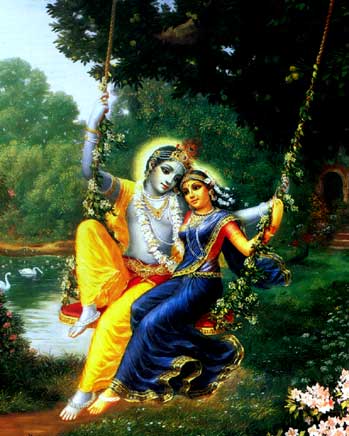
Assamese: জুলন-যাত্ৰা, ঝুলন-যাত্ৰা,
Karbi: jejot keyot,
Dimasa: julon jatra
Related Idea:
a. Proper Noun-Masculine: Krishna, অচ্যুত, অটলবিহাৰী, অধোক্ষজ, অনংগমোহন...
36. Hinduism(Proper Noun-Masculine) The god of water as per Hindu mythology. হিন্দু লোকবিশ্বাসমতে পানীৰ অধিপতি দেৱতা ৷
Assamese: জলকান্তা, জলদেৱতা, জলপতি, জলাধিপ, জলাধিপতি, তোয়েশ, পাশপাণি, পাশভৃৎ, প্ৰচেতস, প্ৰচেতা, বৰুণ, বৰুণদেৱ, যাদঃপতি
37. Hinduism(Proper Noun-Neuter) (the puja celebrated on) the eight day of Durga Puja or Navaratri. দুৰ্গা পূজাৰ অষ্টমী তিথি(ৰ দিনা হোৱা পূজা)৷
38. Hinduism(Abstract Noun) annual ritual performed wishing enternal peace of the departed soul মৃতকৰ আত্মাৰ সদগতি কামনা কৰি প্ৰতি বছৰে অনুষ্ঠিত কৰা মাঙ্গলিক অনুষ্ঠান
39. Hinduism(Proper Noun-Neuter) a village near Mathura where Lord Krishna spent his childhood শ্ৰীকৃষ্ণৰ শিশুলীলাৰ স্থান, মথুৰাৰ ওচৰৰ এখন গুৱাল-গাওঁ
40. Hinduism(Proper Noun-Feminine) the snake-goddess, i.e. the goddess of the serpent tribe জৰৎকাৰু মুনিৰ ভাৰ্য্যা, বাসুকীৰ ভনীয়েক আৰু আস্তিক মুনিৰ মাক; নাগৰাণী
Assamese: জগদগৌৰী, জৰৎকাৰী, নাগমাতা, নাগেশ্বৰী, পদ্মলাঞ্ছনা, পদ্মাদেৱী, বাহুৰা, বিষহৰা, বিষহৰী, মনসা, মাৰৈ, শৈৱী, সিদ্ধযোগিনী
41. Hinduism(Common Noun-Feminine) wife of the Hindu god of love, Kamdev হিন্দুশাস্ত্ৰমতে প্ৰেমৰ দেৱতা কামদেৱৰ পত্নী
Assamese: কন্দৰ্পপত্নী, কামকলা, কামদেৱী, কামপত্নী, কামশক্তি, কেলিকিলা, মদনপত্নী, ৰতি,
Bangla: রুটি,
Nepali: कामपत्नी, मदनपत्नी
42. Hinduism(Abstract Noun) a single hair left on the head (of a male) as a part of a ritual observed by caste Hindus বৰ্ণহিন্দুৰ এক প্ৰথা অনুসৰি ল’ৰাৰ গোটেইটো মূৰ খুৰাই মাজ মূৰত ৰখা এডাল চুলি
43. Hinduism(Verbal Noun) the ceremony of tonsure for young males observed by the caste Hindus (like Brahmins), in which only one hair is left on the head ব্ৰাহ্মণ আদি বৰ্ণহিন্দুৰ ল’ৰা সন্তানৰ এক সংস্কাৰ, য’ত মূৰৰ সকলো চুলি খুৰাই কেৱল মাজ-মূৰত এডাল চুলি (চূড়া) ৰখা হয়
44. Hinduism(Verbal Noun) the ceremony of sending away a god or of immersion of an image into water at the end of a puja. পূজাৰ শেষত দেৱতাক বিদায় দিয়া কাৰ্য্য; প্ৰতিমা পানীত পেলোৱা কাৰ্য্য৷
45. Hinduism(Abstract Noun) an offering made in the name of the departed soul with water and sesamum seed মৃতকৰ আত্মাৰ উদ্দেশ্যে তিল আৰু পানীৰে কৰা তৰ্পণ
46. Hinduism(Verbal Noun) the first day's worship of Durga-puja. দুৰ্গা পূজাৰ ষষ্ঠীৰ দিনা বেল গছক পূজা কৰি নৱপত্ৰিকাৰ বাবে দুটা কেঁচা বেল বৰণ কৰি নিয়া কাৰ্য্য৷
47. Hinduism(Common Noun-Common &/or Masculine) one who immolates an animal offered to a deity দেৱ-দেৱীলৈ উছৰ্গা কৰি জন্তু আদি বলি দিয়া লোক
48. Hinduism(Proper Noun-Feminine) mother of the Asuras and a wife of Kashyapa অসূৰবিলাকৰ মাক আৰু কাশ্যপৰ এগৰাকী পত্নী
49. Hinduism(Proper Noun-Masculine) one of the eight elephants on which the earth is believed to be supported. পৃথিৱীখনক পিঠিত ধাৰণ কৰি থকা বুলি বিশ্বাস কৰা আঠটা হাতীৰ এটা।
50. Hinduism(Proper Noun-Masculine) the elephant of Indra, the King of the Heaven স্বৰ্গৰ ৰজা ইন্দ্ৰৰ হাতী
51. Hinduism(Material Noun-Neuter) the abode of Lord Shiva according to Hindu belief. হিন্দু ধৰ্মীয় বিশ্বাস মতে ভগবান শিৱৰ বাসস্থান।
52. Hinduism(Proper Adj.-Neuter) having a spiritually pure quality অতি পবিত্ৰ বা পুণ্যৱান
53. Hinduism(Verbal Noun) recitation or perusal of the Vedas বেদ পঢ়া বা আবৃতি কৰা কাৰ্য্য
54. Hinduism(Common Noun-Neuter) a religious ceremony performed by Hindus to dispel the evil influence of the planets. গ্ৰহাদিৰ কুফল আঁতৰ কৰিবলৈ হিন্দুসকলে পালন কৰা এক ধৰ্মীয় অনুষ্ঠান।
55. Hinduism(Verb-Trans.) to put fire on the face of the corpse before lighting the funeral pile চিতা জ্বলোৱাৰ আগেয়ে মন্ত্ৰোচ্চাৰণ কৰি মৃতকৰ মুখত জুই দে
56. Hinduism(Proper Noun-Neuter) the car festival of Jagannatha in the month of Asadha (Ahar). আহাৰ মহীয়া উদ্যাপন কৰা, জগন্নাথৰ মূৰ্ত্তি ৰথত তুলি ফুৰোৱা এক উৎসৱ৷
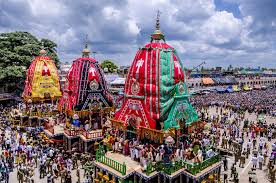
57. Hinduism(Verbal Noun) the act of subduing by charm মন্ত্ৰোচ্চাৰণৰ দ্বাৰা বশ বা দমন কৰা কাৰ্য্য
58. Hinduism(Proper Noun-Masculine) a famous sage, son of sage Kuxik কুশিক মুনিৰ পুত্ৰ, এজন প্ৰসিদ্ধ ঋষি
59. Hinduism(Common Noun-Neuter) one or more mystic letters or words pronounced at the beginning of an incantation মন্ত্ৰোচ্চাৰণৰ আৰম্ভণিতে উচ্চাৰিত এক বা ততোধিক আখৰ বা শব্দ, যেনেঃ ওঁ, হ্ৰিং, ক্ৰিং ইত্যাদি
60. Hinduism(Verbal Noun) a feast arranged in honour of the Brahmans ব্ৰাহ্মণসকলৰ নিমিত্তে আয়োজন কৰা ভোজ
61. Hinduism(Verbal Noun) the act of pouring ghee into a sacrificial fire ঘিঁ বা ঘিঁউৰে দিয়া আহুতি, অৰ্থাৎ হোমাগ্নিত ঘিঁ ঢলা কাৰ্য্য
62. Hinduism(Verbal Adj.) sanctified by incantation or mantra. মন্ত্ৰোচ্চাৰণৰ দ্বাৰা পৱিত্ৰ কৰা।
63. Hinduism(Proper Noun-Masculine) a character in the Ramayan. He assisted Ram in his fight against Ravan. ৰামায়ণৰ এক মুখ্য বান্দৰ চৰিত্ৰ৷ তেওঁ ৰামক ৰাৱণৰ বিৰুদ্ধে যুঁজত সহায় কৰিছিল৷
64. Hinduism(Proper Noun-Feminine) mother of Hanuman, the monkey god who can fly. হনুমানৰ মাক।
65. Hinduism(Proper Adj.-Neuter) happening as per Hindu religious tradition or rites হিন্দু ধৰ্মীয় ৰীতি বা পৰম্পৰা অনুসৰি হোৱা
66. Hinduism(Material Noun-Neuter) the presents in terms of cloths and other items given to the religious guru as a death rite of the disciple শিষ্যৰ মৃত্যুত ধৰ্মীয় পৰম্পৰা অনুসৰি গুৰুলৈ আগবঢ়োৱা কাপোৰ বা আন বস্তুৰ উপহাৰ
67. Hinduism(Common Noun-Common) one who restrains his/her senses and dedicates life for religious learning ইন্দ্ৰিয় বশ কৰি কেৱল ধৰ্মীয় শিক্ষাত ব্ৰতী লোক, অৰ্থাৎ ব্ৰহ্মচৰ্য্য পালন কৰা লোক
68. Hinduism(Proper Noun-Masculine) Ravana`s brother and king of The Hell, he kidnapped Rama and Laxman. He was killed by Hanuman ৰাৱণৰ ভায়েক আছিল৷ ৰাম আৰু লক্ষ্মণক অপহৰণ কৰি নিছিল৷ হনুমানৰ হাতত নিহত হৈছিল৷
69. Hinduism(Proper Noun-Masculine) An ancient king of Magadha killed by Bhima. মগধ দেশৰ এজন ৰজাৰ নাম৷ তেওঁ কংস ৰজাৰ মোমায়েক আছিল আৰু ভীমৰ হাতত মৃত্যু হ’ল৷ তেওঁ দুই খণ্ড হৈ উপজিছিল৷ পাছত জৰা নামৰ ৰাক্ষসীয়ে দুই খণ্ড লগ লগোৱাত জীৱন পালে বুলি পুৰাণত লিখা আছে৷
70. Hinduism(Proper Noun-Feminine) the wife of Satrughna, the youngest son of King Dasarath and the youngest brother of Lord Ram. দশৰথৰ নুমলীয়া পুত্ৰ, ৰামৰ সৰু ভায়েক শত্ৰুঘ্নৰ পত্নী৷
71. Hinduism(Proper Noun-Masculine) son of Kunti, mother of the Pandavas, a illegal son born to Surya (the Sun) and Kunti পাণ্ডৱৰ মাতৃ কুন্তীৰ অবৈধ সন্তান, সূৰ্য্য দেৱতা আৰু কুন্তীৰ পুত্ৰ
72. Hinduism(Material Noun-Neuter) wooden idol of God কাঠেৰে নিৰ্ম্মিত ঈশ্বৰৰ মূৰ্ত্তি
73. Hinduism(Proper Noun-Neuter) a puja for Lord Vishnu. হিন্দুৰ অন্যতম প্ৰধান দেৱতা শ্ৰীবিষ্ণুক কৰা পূজা৷
74. Hinduism(Material Noun-Neuter) three offerings made to the deity or god দেৱতালৈ উছৰ্গা কৰা তিনি প্ৰকাৰৰ বস্তু - পাদোদক, নিৰ্মালি আৰু নৈবেদ্য
75. Hinduism(Material Noun-Neuter) flowers, tulsi or a garland offered to a deity or offered by a guru with his blessings দেৱতালৈ আগবঢ়োৱা অথবা গুৰুৱে আশীৰ্ব্বাদ স্বৰূপে দিয়া ফুল, তুলসী বা মালা
76. Hinduism(Proper Noun-Masculine) the preceptor or guru of the Asuras (demons) অসুৰ বা দৈত্য সকলৰ গুৰু
77. Hinduism(Material Noun-Neuter) a sacred lamp kept burning indefinitely, especially in a Hindu temple হিন্দু মঠ-মন্দিৰত অনিৰ্দিষ্ট কাল ধৰি জ্বলাই ৰখা চাকি
78. Hinduism(Common Noun-Common &/or Masculine) a person well-versed in the Vedanta বেদান্ত বিষয়ক ব্যুৎপত্তি থকা লোক
79. Hinduism(Material Noun-Neuter) clothing put on an idol of god or goddess. দেৱ-দেৱীৰ মূৰ্ত্তিক পিন্ধোৱা কাপোৰ।
80. Hinduism(Proper Noun-Masculine) Shuk was the son of sage Vyasa, who was the writer of the Vedas. He was a great scholar and recited Bhagawata in front of king Parikshit. শুকদেৱ বেদ-প্ৰণেতা ব্যাস মুনিৰ পুত্ৰ আছিল৷ তেওঁ অতি বিদ্বান শাস্ত্ৰজ্ঞ পণ্ডিত আছিল আৰু ৰজা পৰীক্ষিতক ভাগৱত শুনাইছিল৷
81. Hinduism(Proper Noun-Feminine) mother of Ravana, the king of Lanka লঙ্কেশ্বৰ ৰাৱণৰ মাক
82. Hinduism(Proper Noun-Feminine) the second of King Da?aratha's three wives and a queen of Ayodhy?. She was the mother of Bharata. (ৰামায়ন) অযোধ্যাৰ ৰজা দশৰথৰ পাটৰাণী
83. Hinduism(Proper Noun-Feminine) wife of the sage Agastya অগস্ত্য মুনিৰ ভাৰ্য্যা৷
84. Hinduism(Proper Noun-Masculine) The Hindu God for machines.
85. Hinduism(Abstract Noun) A vedic verse written in classical Sanskrit সংস্কৃত ভাষাত লিখা বৈদিক কাব্যৰ ছন্দোবদ্ধ দুটা শাৰী
86. Hinduism(Common Noun-Masculine) the name of a sage celebrated in Ramayana. পহুৰ নিচিনা শিং থকা এজন ঋষি৷
87. Hinduism(Proper Noun-Masculine) the king of the bears, with whom Lord Krishna faught and won away the Shyamantok Moni ভালুকৰ ৰজা, যাৰ সৈতে শ্ৰীকৃষ্ণই যুদ্ধ কৰি শ্যমন্তক মণি উদ্ধাৰ কৰিছিল ৷
88. Hinduism(Proper Noun-Neuter) a long and broad mark with paint on the forehead শোভা বা ধৰ্মৰ নিমিত্তে কপালত পথালিকৈ দিয়া দীঘল, বহল ফোঁট
89. Hinduism(Proper Noun-Neuter) sea of milk as mentioned in the Hindu religious script, the `Puranas` হিন্দু শাস্ত্ৰ পুৰাণত উল্লেখিত গাখীৰৰ সাগৰ
90. Hinduism(Common Noun-Common) worshiper of Shiva যি শিৱৰ উপাসক
91. Hinduism(Common Noun-Common &/or Masculine) the gods and the demons দেৱতা আৰু অসুৰবিলাক
92. Hinduism(Proper Noun-Neuter) the third era according to the Puranas/Hindu faith. পুৰাণ/হিন্দু বিশ্বাস অনুসৰি চাৰি যুগৰ তৃতীয় যুগ৷
93. Hinduism(Proper Noun-Feminine) daughter of King Dasharath, who was adopted by King Lompad ৰজা দশৰথত জীয়েক, যাক লোমপাদ ৰজাই তুলি লৈছিল
94. Hinduism(Proper Adj.-Common) produced or emerging from water with which the feet of a guru or god have been washed গুৰু অথবা দেৱতাৰ ভৰি ধোৱা পানী (পাদোদক)ৰ পৰা উৎপন্ন হোৱা
95. Hinduism(Verb-Trans.) to invoke a heavenly figure like a deity by means of deep prayer for years in the woods by shunning all material pleasure সকলো বিষয়-সুখ পৰিহাৰ কৰি হাবিত বহুবছৰ ধৰি গভীৰ আৰাধনা কৰি দেৱতাৰ দৰে কোনো স্বৰ্গীয় সত্বাক উপাসনা অথবা আহ্বান কৰ্
96. Hinduism(Abstract Noun) incomplete or partial auterity অসম্পূৰ্ণ বা আংশিক তপস্যা
97. Hinduism(Proper Adj.-Common &/or Masculine) one who has undergone great penance. যি মহৎ তপস্যা সম্পূৰ্ণ কৰিছিল।
98. Hinduism(Abstract Noun) sound, touch, beauty, taste and smell - the subtle rudiment of elementary matter (according to Hindu Philosophy) শব্দ, স্পৰ্শ, ৰূপ, ৰস আৰু গন্ধ - এই পাঁচটা মূল সূক্ষ্ম বস্তু, যাৰ পৰা আনবোৰ বস্তু উৎপত্তি হয় (হিন্দু দৰ্শনৰ মতে)
99. Hinduism(Abstract Noun) a special prayer in honour of nine predecessors performed before an important event like marriage ceremony (according to Hindu rites). বিয়া আদি গুৰুত্বপূৰ্ণ অনুষ্ঠানৰ আগেয়ে নজনা পূৰ্বপুৰুষক সুৱঁৰি কৰা বিশেষ পূজা বা শৰাধ (হিন্দু প্ৰথামতে)।
100. Hinduism(Abstract Noun) the region between the earth and the heaven স্বৰ্গ আৰু মৰ্ত্ত্যৰ মাজৰ অঞ্চল
101. Hinduism(Material Noun-Neuter) a ball of rice mixed with milk, sugar, banana etc. that is offered in the name of deceased ancestor as a ritual মৃতকৰ উদ্দেশ্যে আগবঢ়োৱা চাউল, গাখীৰ, কল আদি মিহলাই প্ৰস্তুত কৰা লাড়ু
102. Hinduism(Material Noun-Neuter) ashes collected from funeral pyre of a dead person as per Hindu ritual হিন্দু ধৰ্মীয় ৰীতি অনুসৰি মৃতকক খৰি দিয়াৰ পাচত চিতাৰ পৰা সংগ্ৰহ কৰা ছাই
103. Hinduism(Proper Noun-Neuter) A Shiva mandir in North Guwahati Assam অসমৰ উত্তৰ গুৱাহাটীত অৱস্থিত পৌৰাণিক শিৱ মন্দিৰ৷
104. Hinduism(Abstract Noun) A dance form related to Hindu God Shiva
শিৱৰ লগত সম্পৰ্কযুক্ত দুটি নৃত্যৰ নাম হ`ল তাণ্ডৱ আৰু লাস্য৷
105. Hinduism(Proper Noun-Masculine) A character of Bhagawat. Childhood friend of Lord Krishna গোপ বালক৷ শ্ৰীকৃষ্ণৰ বাল্যকালৰ সংগী৷
106. Hinduism(Proper Noun-Masculine) Patañjali is a Sanskrit proper name. Several important Sanskrit works are ascribed to one or more authors of this name, and a great deal of scholarship has been devoted over the last century or so to the issue of disambiguation কেবাখনো সংস্কৃত গ্ৰন্থৰ লগত জৰিত সংস্কৃত পণ্ডিত৷
107. Hinduism(Proper Noun-Feminine) Iravati is a character in the mythology of India. She is a daughter of Kadru and granddaughter of Kasyapa. She is the mother ofAiravata, the mount of Indra কাশ্যপৰ নাতি, ইন্দ্ৰৰ হাতী ঐৰাৱতৰ মাক৷
108. Hinduism(Proper Noun-Masculine) A character of Bhagawat. Childhood friend of Lord Krishna গোপ বালক৷ শ্ৰীকৃষ্ণৰ বাল্যকালৰ সংগী৷
109. Hinduism(Proper Noun-Masculine) Nandi is the name for the bull which serves as the mount (Sanskrit: Vahana) of the god Shiva and as the gatekeeper of Shiva and Parvati. শিৱৰ বাহন৷ শৱ-পাৰ্বতীৰ দুৱাৰৰখীয়া৷
110. Hinduism(Proper Noun-Masculine) A character of Mahabharata. Youngest brother of Dorjyodhan. মহাভাৰতৰ এটি চৰিত্ৰ৷ দুৰ্যোধনৰ কণিষ্ঠ ভায়েক৷
111. Hinduism(Proper Noun-Neuter) According to Puranic cosmography, the entire Cosmos is divided into seven concentric island continents (sapta-dvipa vasumati) separated by the seven encircling oceans, each double the size of the preceding one (going out from within). The seven continents of the Puranas are stated as Jambudvipa,Plaksadvipa, Salmalidvipa, Kusadvipa, Krouncadvipa, Sakadvipa, andPushkaradvipa. Seven intermediate oceans consist of salt-water, sugarcane juice, wine, ghee, curd, milk and water respectively পুৰাণত উল্লেখ থকা সাতটা দ্বীপ আৰু সাতখন সাগৰৰ এটা দ্বীপ হল জাম্বুদ্বীপ৷
112. Hinduism(Proper Noun-Masculine) king of Hastinapur and the father of Kauravas in the epic Mahabharata হস্তিনাপুৰৰ ৰজা আৰু মহাকাব্য মহাভাৰতৰ কৌৰৱসকলৰ পিতৃ
113. Hinduism(Abstract Noun) Hindu ritual. Day before a religious occation. অধিবাস হৈছে কোনো পৱিত্ৰ বৈদিক অনুষ্ঠানৰ আগৰ দিন৷ এইদিনা কৰ্তা আৰু সংশ্লিষ্ট ব্যক্তিসকলে নীতি-নিয়মৰ পালনেৰে অতিবাহিত কৰিব লাগে৷
114. Hinduism(Proper Noun-Neuter) A rocky island in the middle of River Brahmaputra near Umananda island near Guwahati. গুৱাহাটীৰ উমানন্দৰ কাষত ব্ৰহ্মপুত্ৰৰ বুকুত এচপৰা শিলা৷ জনশ্ৰুতিৰ মতে নতৰ্কী উৰ্বশী শাপভষ্ঠা হৈ শিলহৈ আছে৷
115. Hinduism(Proper Noun-Masculine) One(fift) of the Pandavs পঞ্চ পাণ্ডৱৰ পঞ্চমজন৷
116. Hinduism(Proper Noun-Masculine) Eldest of the Pandavs. Eldest son of Kunti পঞ্চ পাণ্ডৱৰ ডাঙৰজন৷ কুন্তিৰ ডাঙৰ পুতেক৷
117. Hinduism(Proper Noun-Masculine) one of the main charecter of Mahabharat. মহাভাৰতৰ অন্য এক ঐতিহাসিক পুৰুষ ৷ সৰ্ব্বজন বিদিত যে কুৰুক্ষেত্ৰ ৰণত কামৰূপৰ ৰজা ভগদত্তই কৌৰৱৰ পক্ষ লৈ যুদ্ধ কৰিছিল ৷ কাৰণ জেষ্ঠ কৌৰৱ দুৰ্যোধন আছিল ভগদত্তৰ জোঁৱায়েক ৷ ভগদত্ত ৰজাৰ কন্যা ভানুমতীক বিয়া কৰাইছিল দুৰ্যোধনে ৷
118. Hinduism(Proper Noun-Masculine) one of the main charecter of Mahabharat. মহাভাৰতৰ শকুনি প্ৰধান খল-নায়ক৷
119. Hinduism(Proper Noun-Masculine) A character of Mahabharat. The second son of Gandhari. কৌৰবৰ দ্বিতীয়জন৷ গান্ধাৰীৰ দ্বিতীয় পুত্ৰ৷
120. Hinduism(Proper Noun-Feminine) A character of Mahabharat. Only daughter of Gandhari. গান্ধাৰীৰ একমাত্ৰ জী৷
121. Hinduism(Proper Noun-Feminine) A female character of Mahabharat. Belive to be from Manipur State. Bhim married to her during exile. ভীমৰ পত্নী৷ বনৱাসৰ সময়ত বিয়া কৰাইছিল৷ মনিপুৰ ৰাজ্যৰ বুলি কোৱা হয়৷
122. Hinduism(Abstract Noun) A religious taxation put upon a dead man to be born by his close relative. It is calculated upon his unfullfilled desire. হিন্দুধৰ্মমতে মৃতকৰ ওপৰত লগোৱা কৰ৷ মৃতকৰ অপুৰণীয় আশাৰ ওপৰত ভিত্তিকৰি ইয়াক গণনা কৰা হয়৷
123. Hinduism(Proper Noun-Masculine) Manu in Hindu tradition is considered to be the first of Brahma`s sons and a progenitor of human race. বাহ্মণ আৰু বাহ্মণ্যবাদৰ পিতৃ-পুৰুষ বুলি গণ্য কৰা হয়৷
124. Hinduism(Proper Noun-Neuter) Manusmriti, translated "Laws of Manu" or "Institutions of Manu," is the most important and authoritative Hindu Law Book (Dharmashastra), which served as a foundational work on Hindu law and jurisprudence in the ancient Indian society. Until the modern times it was the standard reference for both the rulers who patronized Vedic faith and the people who practiced it. বৈদিক যুগৰ সামাজিক আচাৰ নীতি সম্পৰ্কে লেখা পুথি৷ ৰচক মনু৷
125. Hinduism(Abstract Noun) A mass Hindu pilgrimage of faith in which Hindus gather to bathe in a sacred river. It is considered to be the largest peaceful gathering in the world where around 100 million (10 crore) people were expected to visit during the Maha Kumbh Mela in 2013 in Allahabad. It is held every third year at one of the four places by rotation: Haridwar, Allahabad (Prayaga), Nashik and Ujjain. পৱিত্ৰ নদীত গা ধুবলৈ এই মেলাত হিন্দু ধৰ্মালম্বী লোকসকল সমবেত হয়৷ প্ৰতি তিনি বছৰৰ মূৰে মূৰে অনুষ্ঠিত হয়৷
126. Hinduism(Proper Noun-Masculine) A book written by 14th century Assamese poet Ramsaraswati. A character in ancient Hindu mythology. ৰাম সৰস্বতী বিৰচিত প্ৰসিদ্ধ কাৱ্য৷ পৌৰাণিক হিন্দু উপাখ্যানৰ এটা চৰিত্ৰ দেৱীৰ হাতত নিধন হৈছিল
127. Hinduism(Proper Noun-Masculine) A character in ancient Hindu mythology. পৌৰাণিক হিন্দু উপাখ্যানৰ এটা চৰিত্ৰ৷ দেৱীৰ হাতত নিধন হৈছিল৷
128. Hinduism(Proper Noun-Feminine) Daughter of Lord Ganesh.
গণেশৰ জীয়ৰীৰ নাম৷
129. Hinduism(Proper Noun-Feminine) Siddhi and Riddhi-Name of two wifes of Lord Ganesh
ৰিদ্ধি আৰু সিদ্ধি- গণেশৰ দুগৰাকী পত্নীৰ নাম৷
130. Hinduism(Proper Noun-Feminine) Siddhi and Riddhi-Name of two wifes of Lord Ganesh
ৰিদ্ধি আৰু সিদ্ধি- গণেশৰ দুগৰাকী পত্নীৰ নাম৷
131. Hinduism(Proper Noun-Masculine) Bharadwaja also spelled Bhardwaj, was one of the greatest Hindu sages descendant of Sage Angirasa, whose accomplishments are detailed in the Puranas. পুৰাণ আৰু অন্যান্য হিন্দু উপাখ্যানত উল্লেখিত এজন ঋষি৷ বাহ্মন সকলৰ এটা উপাধি৷
132. Hinduism(Proper Noun-Masculine) A character of the Indian epic Mahabharata, Ashwatthama or Ashwatthaman or Drauni was the son of guru Drona and he is the grandson of the Brahmin sage Bharadwaja. Ashwatthama is a mighty Maharathi who fought on the Kaurava side against the Pandavas. মহাৰথী৷ মহাভাৰতৰ অন্যতম চৰিত্ৰ৷ দ্ৰোণাচাৰ্য্যৰ পুত্ৰ৷
133. Hinduism(Proper Noun-Common) Mimamsa, a Sanskrit word meaning `investigation` is the name of an astika (orthodox) school of Hindu philosophy, whose fundamental research is into the nature of dharma, based on close hermeneutics (the development and study of theories of the interpretation and understanding of texts. In present-day usage in religious studies, hermeneutics refers to the study of the interpretation of religious texts) of the Vedas. Its basic tenets are ritualism, anti-asceticism and anti-mysticism. The cardinal aim of the Purva-Mimansa school is elucidation of the nature of dharma, realised as a set ritual obligations and prerogatives to be performed in the right manner. The nature of dharma is not accessible to reason and observation, and must be deduced from the authority of the revelation contained in the Vedas, which are considered eternal, authorless (apaurusheyatva) and unfailing. Jaimini was an ancient Rishi or sage, was a great philosopher and founder of the Mimamsa School of Indian philosophy. ভাৰতীয় দৰ্শনৰ যি ছটা সম্প্ৰদায়ে বেদৰ প্ৰামাণ্য স্বীকাৰ মানি লয়, তাৰে দুটা সম্প্ৰদায় নিঃসংশয়ে বৈদিক বা বেদমূলক৷ এটা হল পূৰ্ব-মীমাংসা বা সংক্ষেপে মীমাংসা, অন্যটি উত্তৰ মীমাংসা বা বেদান্ত৷ বেদৰ যত অন্ত হৈছে, অৰ্থাৎ উপনিষদৰ দৰ্শন হল বেদান্ত৷ এই দৰ্শনৰ এজন বিদগ্ধ পণ্ডিত অসমৰ কুমাৰিল ভট্ট; এওঁ তৰ্ক যুদ্ধত আদিগুৰু শংকৰাচাৰ্য্যক পৰাস্ত কৰিছিল।
134. Hinduism(Abstract Noun) The Vishnu Purana is a religious Hindu text and one of the eighteen Mahapuranas. It is considered one of the most important Puranas and has been given the name Puranaratna. ওঠৰখন পুৰাণৰ অন্যতম, যত বিষ্ণুৰ মাহাত্ম্য বৰ্ণিত হৈছে৷
135. Hinduism(Abstract Noun) One of the major eighteen Puranas. A Hindu religious text, it is divided into five parts and 55,000 verses. The Padma Purana categorizes itself as a Sattva Purana. ওঠৰখন পুৰাণৰ অন্যতম, যত গীতাৰ মাহাত্ম্য বৰ্ণিত হৈছে৷
136. Hinduism(Abstract Noun) Each Veda has been subclassified into four major text types – the Samhitas (mantras and benedictions), the Aranyakas (text on rituals, ceremonies, sacrifices and symbolic-sacrifices), the Brahmanas (commentaries on rituals, ceremonies and sacrifices), and the Upanishads (text discussing meditation, philosophy and spiritual knowledge). Some scholars add fifth category – the Upasanas (worship). প্ৰতিখন বেদ যি ৪ ধৰণৰ গ্ৰন্থৰ সমষ্টি তাৰ এখন হল সংহিতা৷ ঋক, যজু, সাম, অথৰ্ব— প্ৰতিখন বেদ এটি সংহিতা (শ্লোক সংকলন), এটি ব্ৰাহ্মণা (প্ৰাৰ্থনাসমূহৰ গদ্য ব্যাখ্যা) আৰু ব্ৰাহ্মণাৰ দুটি পৰিশিষ্ট— আৰণ্যক আৰু উপনিষদ—লৈ গঠিত৷
137. Hinduism(Abstract Noun) Each Veda has been subclassified into four major text types – the Samhitas (mantras and benedictions), the Aranyakas (text on rituals, ceremonies, sacrifices and symbolic-sacrifices), the Brahmanas (commentaries on rituals, ceremonies and sacrifices), and the Upanishads (text discussing meditation, philosophy and spiritual knowledge). Some scholars add fifth category – the Upasanas (worship). প্ৰতিখন বেদ যি ৪ ধৰণৰ গ্ৰন্থৰ সমষ্টি তাৰ এখন হল ব্ৰাহ্মণ৷ ঋক, যজু, সাম, অথৰ্ব— প্ৰতিখন বেদ এটি সংহিতা (শ্লোক সংকলন), এটি ব্ৰাহ্মণ (প্ৰাৰ্থনাসমূহৰ গদ্য ব্যাখ্যা) আৰু ব্ৰাহ্মণৰ দুটি পৰিশিষ্ট— আৰণ্যক আৰু উপনিষদ—লৈ গঠিত৷
138. Hinduism(Abstract Noun) Each Veda has been subclassified into four major text types – the Samhitas (mantras and benedictions), the Aranyakas (text on rituals, ceremonies, sacrifices and symbolic-sacrifices), the Brahmanas (commentaries on rituals, ceremonies and sacrifices), and the Upanishads (text discussing meditation, philosophy and spiritual knowledge). Some scholars add fifth category – the Upasanas (worship). প্ৰতিখন বেদ যি ৪ ধৰণৰ গ্ৰন্থৰ সমষ্টি তাৰ এখন হল আৰণ্যক৷ ঋক, যজু, সাম, অথৰ্ব— প্ৰতিখন বেদ এটি সংহিতা (শ্লোক সংকলন), এটি ব্ৰাহ্মণ (প্ৰাৰ্থনাসমূহৰ গদ্য ব্যাখ্যা) আৰু ব্ৰাহ্মণৰ দুটি পৰিশিষ্ট— আৰণ্যক আৰু উপনিষদ—লৈ গঠিত৷
139. Hinduism(Proper Noun-Feminine) One of Arjuna`s wives as per The Mahabharata. Arjuna travelled the length and breadth of India during his term of exile. His wanderings took him to ancient Manipura, an almost mystic kingdom renowned for its natural beauty.
মহাভাৰতত উল্লেখিত মনিপুৰৰ জীয়ৰী, অৰ্জুনৰ পত্নী৷
140. Hinduism(Proper Noun-Feminine) One of Arjuna`s wives as per The Mahabharata. মহাভাৰতত উল্লেখিত, অৰ্জুনৰ পত্নী৷
141. Hinduism(Proper Noun-Masculine) A character in epic Mahabharata; He is elelder brouther Rukmini, wife of Lord Krishna. মহাভাৰতত উল্লেখিত, শ্ৰীকৃষ্ণৰ পত্নী ৰুক্মিনীৰ ককায়েক৷
142. Hinduism(Proper Noun-Masculine) Son of Arjuna and Chitrangada as per The Mahabharata. মহাভাৰতত উল্লেখিত, অৰ্জুন আৰু চিত্ৰাংগদাৰ পুত্ৰ৷
143. Hinduism(Abstract Noun) One of the eighteen major Hindu puranas. It is written in Sanskrit and attributed to Vyasa, the compiler of the Vedas. The title Bhavishya Purana signifies a work that contains prophecies regarding the future (Sanskrit: bhavisya). Despite being labelled a purana or "tales of ancient times", the work relates only a few legends. It is one of several puranas in which a list of royal dynasties of the "past" are followed by lists of kings predicted to rule in the future.
১৮ খন মূল পুৰাণৰ অন্যতম৷ বেদৰ প্ৰণেতা ব্যাসদেৱে ৰচনা কৰা বুলি কোৱা হয়৷
144. Hinduism(Proper Noun-Masculine) Father of Parashuram, the sixth incanation Bhagawan.
পৰশুৰামৰ দেউতাক৷ শপ্তৰ্ষী মণ্ডলৰ এজন ঋষি৷
145. Hinduism(Abstract Noun) Upavedas (sciences indirectly related to Vedic study)
ayur-veda, Gandharva-veda, Dhanur-veda, Sthapatya-veda
আয়ুৰ্বেদ, গন্ধৰ্ববেদ, ধনুৰ্বেদ আৰু স্থাপত্যবেদ- এইকেইখনক উপবেদ বোলা হৈছে৷
146. Hinduism(Abstract Noun) Vedangas (auxiliary sciences)
siksa, Chandas, Vyakarana, Nirukta, Jyotisa, Kalpa শিক্ষা, চন্দ্ৰ, ব্যাকৰণ, নিৰুক্ত, জ্যোতিষ আৰু কল্প-- এইকেইখন শাস্ত্ৰক বেদাংগ বোলা হৈছে৷
147. Hinduism(Material Noun-Neuter) A divine weapon, irresistible, one given by Lord Brahma himself. ব্ৰহ্মাই দিয়া অপ্ৰতিৰোধ্য স্বৰ্গীয় অস্ত্ৰ৷
148. Hinduism(Proper Noun-Masculine) Son of Dilipa, king of Kosala who worshipped Shiva and brought down Ganges.
কোশল ৰাজ দিলীপৰ পুত্ৰ৷ শিৱক আৰাধনা কৰি তেওঁ গংগাক পৃথিৱীলৈ বোৱাই অনাইছিল৷
149. Hinduism(Abstract Noun) One of the six disciplines of Vedanga, treating ritual. বেদাংগৰ ছটা ভাগৰ এটা৷ ৰীতি-নীতি সম্পৰ্কীয় জ্ঞান৷
150. Hinduism(Abstract Noun) An ancient Indian treatise on the performing arts, encompassing theater, dance and music. চাৰিখন উপবেদৰ এখন৷ পৰিৱেশ্য কলা সম্পৰ্কীয় জ্ঞান৷
151. Hinduism(Abstract Noun) The term derives from the words for bow (dhanushya) and knowledge (veda), literally the "science of archery".
চাৰিখন উপবেদৰ এখন৷ ধনু সম্পৰ্কীয় জ্ঞান৷
152. Hinduism(Proper Noun-Feminine) Dhritarashtra`s wife and queen mother of the Kauravas. কৌৰৱৰ মাতৃ, ধৃতৰাষ্ট্ৰৰ পত্নী৷
153. Hinduism(Proper Noun-Neuter) Arjuna`s most potent bow. দেৱতাৰ পৰা দান পোৱা অৰ্জুনে ব্যৱহাৰ কৰা শক্তিশালী ধনু৷
154. Hinduism(Proper Noun-Masculine) A Vedic king, son of Atharvan, who turned a great Rishi. Dadhicha gave his bones to destroy Vritra, a brahmin, who became the head of the Asuras.
অসুৰৰ ৰজাক বধ কৰিবলৈ ঋষি দধিচিয়ে নিজৰ হাড় দান দিছিল৷
155. Hinduism(Abstract Noun) Three supreme goddess of Hinduism. They are Sarswati, goddress of creation, Lakshi, goddress of preservation and Parvati, goddress of destruction.
হিন্দু বিশ্বাস মতে তিনিজন মূল দেৱতা৷ সৰস্বতী, লক্ষ্মী আৰু পাৰ্ৱতী৷ এওঁলোক ক্ৰমে সৃষ্টি,স্থিতি আৰু প্ৰলয়ৰ দেৱতা৷
156. Hinduism(Abstract Noun) Three supreme gods of Hindu. They are Brahma, the god of creation, Bishnu, the god of preservation and Shiva, the god of destruction.
হিন্দু বিশ্বাস মতে তিনিজন মূল দেৱতা৷ বহ্মা, বিষ্ণু আৰু শিৱ৷ এওঁলোক ক্ৰমে সৃষ্টি,স্থিতি আৰু প্ৰলয়ৰ দেৱতা৷
157. Hinduism(Abstract Noun) a theory or doctrine that denies the existence of a distinction or duality in a particular sphere, such as that between matter and mind, or God and the world.
আত্মা আৰু পৰমাত্মা দুটা সুকীয়া নহৈ, একেটা সত্বা বুলি ভবা ভাৰতীয় দৰ্শণৰ এটি ভাগ৷
158. Hinduism(Abstract Noun) An extreme socio-political viewpoint of Hinduism.
হিন্দু ধৰ্ম সংক্ৰান্তীয় এক চৰম সমাজ-ৰাজনৈতিক মতবাদ
159. Hinduism(Proper Noun-Masculine) a son of Hiranyadhanu, the name of a Nishada prince. (In the past, Dronacharya did not keep him as a disciple and did not teach him archery because he was an inferior race. He went back and made a wooden idol of Drona himself and practiced weapons before it. When Dronacharya saw that Ekalavya was more skilled in weapons than his disciple Arjuna, he asked for the thumb of Ekalavya`s right hand as a gurudakshina and Ekalavya immediately cut off the finger and handed it over to Dronacharya.)
নিষাদৰাজ হিৰণ্যধনুৰ পুত্ৰ৷ (পূৰ্ব কালত হীন জাতি বুলি দ্ৰোণাচাৰ্যই তেওঁক শিষ্য কৰি নাৰাখি আৰু অষ্ট্ৰবিদ্যা নিদিয়াত তেওঁ উলটি গৈ নিজে কাঠৰ দ্ৰোণমুৰ্তি এটা সাজি ইয়াৰ আগত অস্ত্ৰ শিক্ষা অভ্যাস কৰি পাৰদৰ্শী হৈ উঠে৷ যেতিয়া দ্ৰোণাচাৰ্যই দেখিলে যে একলব্যই তেওঁৰ শিষ্য অৰ্জুনতকৈ বেছি অস্ত্ৰ বিদ্যাত পাৰ্গত হল তেতিয়া তেওঁ একলব্যৰ সোঁ হাতৰ বুঢ়া আঙুলি টো গুৰুদক্ষিণা হিচাপে বিচাৰিলে আৰু একলব্যই ততালিকে আঙুলি টো কাটি দ্ৰোণাচাৰ্যক অৰ্পন কৰিলে৷)
160. Hinduism(Proper Noun-Common &/or Masculine) the name of the younger brother of the Lord Indra.
ভগৱান ইন্দ্ৰৰ কনিষ্ঠ ভাতৃৰ নাম৷
161. Hinduism(Proper Noun-Masculine) a king belonging to the solar race, son of Prasenjit through Gauri, father of Mandhata.
সূৰ্যবংশীয় এজন ৰজা, গৌৰী আৰু প্ৰসেনজিতৰ পুত্ৰ, মান্ধাতাৰ পিতৃ৷
162. Hinduism(Proper Noun-Masculine) the son of Arjuna, a legendary warrior from Mahabharata
163. Hinduism(Proper Noun-Masculine) Siva of Kalpagrama, an earthly Sivalinga of Kailasha, worshipped by Durga.
কল্পগ্ৰামস্থ শিৱ, দুৰ্গাই আৰাধনা কৰা কৈলাসস্থিত শিৱলিংগ৷
164. Hinduism(Verbal Adj.) having an arm lifted up
এক বাহু ওপৰলৈ কৰি থকা (এক প্ৰকাৰৰ তপস্যা)৷
165. Hinduism(Material Noun-Neuter) the club of Lord Vishnu
বিষ্ণুৰ গদা
166. Hinduism(Proper Noun-Masculine) the son of Lord Indra
167. Hinduism(Material Noun-Neuter) the necklace or jewel of Vishnu
বিষ্ণুৰ ডিঙিৰ মালা
168. Hinduism(Common Noun-Feminine) wife of a Brahmin
ব্ৰাহ্মণৰ পত্নী

